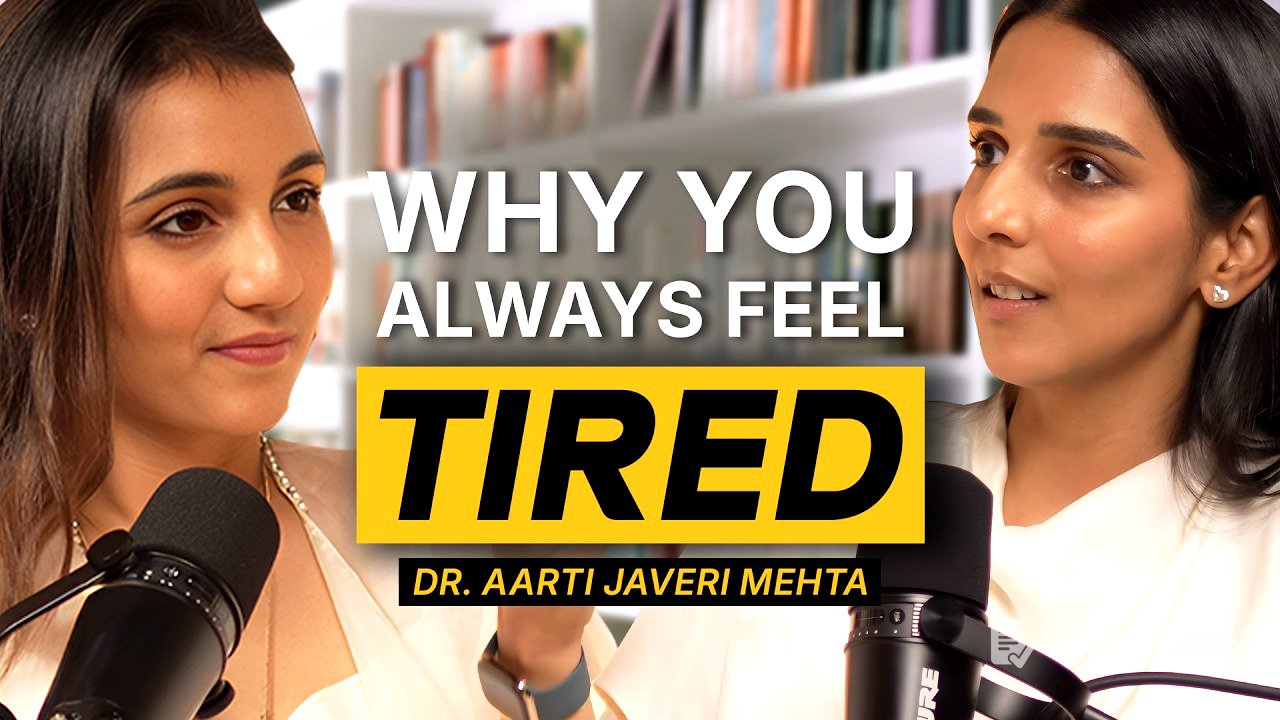TLDR;
This video features Masoom Minawala in conversation with Dr. Aarti, a lifestyle medicine physician and longevity expert, discussing gut health. They touch upon common gut issues, debunk myths around food and dieting, and provide actionable advice for improving gut health. Key takeaways include understanding the gut-brain connection, the importance of a diverse diet rich in fiber and fermented foods, and the role of lifestyle factors like stress management and movement.
- Gut health significantly impacts overall well-being, including mood, energy, and immune function.
- Lifestyle changes, including diet and stress management, can positively influence gut health within 24 hours.
- Focus on incorporating a variety of plant-based, fiber-rich foods and fermented foods into your diet.
Intro [0:00]
Masoom introduces the topic of gut health, highlighting her personal struggles with bloating and fatigue post-pregnancy. She emphasizes that gut issues can significantly impact various aspects of life, including mood, productivity, and relationships. She brings in Dr. Aarti to share her expertise on gut health and female health, aiming to provide viewers with insights and solutions for their own gut-related problems.
Masoom’s Post-Pregnancy Gut Struggles [1:10]
Masoom shares her personal experience with gut health issues following her pregnancies. She describes experiencing fatigue, bloating, discomfort, and indigestion, which she initially attributed to postpartum changes. After her second baby, she sought help from Dr. Aarti, realizing that these issues were significantly impacting her life, including her mood, productivity, and relationships. She emphasizes the importance of addressing gut health for overall well-being.
Meet Dr Aarti & Why Gut Health Matters [3:03]
Dr. Aarti introduces herself as a lifestyle medicine physician and longevity expert. She highlights that 40% of people worldwide experience digestive issues, often seeing multiple doctors before identifying the gut as the root cause. She emphasizes that many women normalize these symptoms, but there are ways to address the root cause and improve gut health. Dr. Aarti mentions creating a non-restrictive meal plan for Masoom after her second baby's delivery.
Rapid-Fire: 3 Things to Know About Gut Issues [3:59]
Dr. Aarti shares three key things to know about gut issues: recognize your symptoms and understand what's normal, lifestyle plays a significant role in changing your gut (it's very forgiving), and don't ignore smaller things like stress and sleep. She emphasizes that changes in diet and lifestyle can impact gut health in as little as 24 hours.
Three Gut-Destroying Habits to Quit [4:58]
Dr. Aarti identifies three habits to stop to improve gut health: avoid overuse of non-prescribed medications (especially antibiotics), watch alcohol intake (it can destroy the gut), and pay attention to stress levels. She explains the connection between stress and gut health through the vagus nerve, which links the brain and gut.
Gut-Brain Connection Explained [5:55]
Dr. Aarti explains the gut-brain connection, noting that the gut is often called the second brain due to the presence of nearly 500 million nerves. She details how the gut and brain communicate through the vagus nerve, a two-way pathway. The gut also produces chemicals, neurotransmitters, and hormones like serotonin (90% of receptors are in the gut) and dopamine (50% of receptors are made in the gut), influencing mood and satiety.
Probiotic Pills: Hype vs. Science [8:12]
Dr. Aarti addresses the common belief that probiotic supplements are a cure-all for gut health, calling it "rubbish." While probiotics can help in certain conditions, they are overhyped compared to the impact of lifestyle changes on the gut microbiome. She suggests focusing on lifestyle improvements for better gut health.
Gut Microbiome 101: Good Bugs & Fiber [9:07]
Dr. Aarti explains that gut health is about optimal digestion, nutrient absorption, and waste elimination. The gut microbiome consists of trillions of microorganisms (bacteria, viruses, fungi, parasites, archaea) in the digestive tract, from mouth to anus. She clarifies that most gut bacteria are beneficial, feeding on fiber to produce short-chain fatty acids that regulate appetite, metabolism, blood sugar, and hormones. 70-80% of immune cells are in the gut, highlighting its role in overall immunity.
Symptoms, Poop Chart & When to Worry [14:49]
Dr. Aarti outlines symptoms indicating gut health issues, including changes in bowel habits (frequency and consistency), cognitive issues (brain fog, focus), menstrual cycle problems, bloating, abdominal pain, skin issues (eczema), frequent infections, and allergies. She references the Bristol stool chart to understand stool consistency. She also touches upon the chicken-and-egg situation between gut health and anxiety.
Gut Health, Weight Loss & the Twin-Mice Study [17:12]
Dr. Aarti addresses the connection between gut health and weight loss, cautioning against creating a direct cause-and-effect relationship. She references a study involving twins with different body types, where fecal transplants into sterile mice resulted in the mice replicating the body types of their donors, even with the same calorie intake and activity levels. This illustrates the gut microbiome's role in appetite regulation, hunger, and satiety.
Meal Timing, Circadian Rhythm & Digestion [19:07]
Dr. Aarti discusses the impact of meal timing on gut health, emphasizing the importance of aligning with the body's circadian rhythm. Eating late at night disrupts digestion because the body's metabolism and intestinal motility naturally slow down. She recommends finishing meals 2-3 hours before bedtime to improve digestion. She also highlights the 80/20 rule, allowing for flexibility and normal life while maintaining healthy habits 80% of the time.
Cinnamon-Ginger-Ajwain Water: Fact or Fad? [22:30]
Dr. Aarti discusses the benefits of cinnamon, ginger, and ajwain water. Cinnamon has anti-inflammatory properties, ginger aids digestion and motility, and water promotes hydration and bowel movement. While studies on the specific concoction are limited, the individual components have known benefits. She rates hot water and lemon a 4/10, suggesting better alternatives for hydration and gut motility.
Veggies, Fiber & Craving Conversion [24:46]
Dr. Aarti emphasizes the importance of increasing whole food, plant-based, fiber-rich foods for gut health. She notes that many people don't eat enough vegetables and recommends gradually increasing vegetable and fiber intake to avoid digestive issues. She shares a personal anecdote about craving vegetables after consistently incorporating them into her diet, highlighting how changing the gut bacteria composition can alter food choices and cravings.
Gluten, Carbs & Food Guilt Debunked [28:32]
Dr. Aarti addresses the demonization of carbs, emphasizing that they are present in many healthy foods like legumes, lentils, and whole grains. She advises against cutting out carbs for weight loss, as it eliminates beneficial whole grains. Unless medically necessary (celiac disease or gluten sensitivity), cutting out gluten is unnecessary and can reduce the diversity of gut microbes. She encourages eating everything without guilt, rejecting calorie counting and restrictive meal plans.
Bloating Deep-Dive: 25 Causes & SIBO [33:13]
Dr. Aarti discusses bloating, noting that 40% of women experience it. She distinguishes between normal bloating after meals and problematic bloating accompanied by pain or changes in bowel habits. There are 25+ causes of bloating, ranging from eating too quickly to underlying medical conditions like SIBO (small intestinal bacterial overgrowth) or female health issues. She advises against relying on anti-bloat pills and herbal detoxes, emphasizing the need to identify and address the root cause with a healthcare professional.
Bread, Ferments & Postpartum Diet Myths [40:50]
Dr. Aarti debunks the myth that bread is inherently bad, emphasizing that quality matters. She highlights the benefits of fermented foods like sourdough bread, yogurt, kefir, and sauerkraut for gut health. She also addresses the misconception that fermented foods should be avoided postpartum, explaining that they can improve gut health by populating the gut with beneficial bacteria. She clarifies common postpartum dietary myths, such as avoiding raw foods or foods that cause colds, stating that these are often based on outdated beliefs about preventing infections.
Coffee vs. Matcha: Caffeine & the Gut [48:21]
Dr. Aarti addresses the misconception that coffee increases cortisol levels, stating that studies show cortisol levels return to normal after a few days of coffee consumption. Moderate coffee intake can improve lipid profile, sugar sensitivity, and metabolic health. However, for those sensitive to caffeine, matcha is a good alternative, providing caffeine and antioxidants without the crash. She recommends drinking 2-3 liters of water daily for optimal gut health, and adding flavors like basil, lemon, or cucumber is fine.
Movement Matters: Walking, Cardio & Strength [51:08]
Dr. Aarti emphasizes that exercise is not primarily for weight loss, but for improving gut health and overall well-being. Aerobic training (cardio) strengthens the heart and lungs, resistance training builds muscle, and flexibility exercises are also beneficial. Even 10 minutes of exercise daily can improve blood pressure, cognition, and focus. She stresses that walking is exercise and that building muscle through strength training is crucial for long-term health, especially for bone strength during perimenopause.
Five Gut-Friendly Foods (+ Chia & Moong Sprouts) [53:56]
Dr. Aarti lists five things to add to your plate for better gut health: a variety of vegetables, lentils/legumes/seeds/nuts, fermented foods (yogurt, sauerkraut, kimchi, tempeh), whole grains, and adequate hydration. Masoom shares that chia seeds and moong sprouts have been game changers for her gut health, providing fiber, protein, healthy fats, and promoting satiety.
Wrap-Up, Key Takeaways & What’s Next [55:48]
Masoom and Dr. Aarti summarize the key takeaways from the episode, emphasizing the importance of gut health for overall well-being and providing actionable advice for improving gut health through diet and lifestyle changes. They encourage viewers to subscribe for more content and share their thoughts in the comments.









